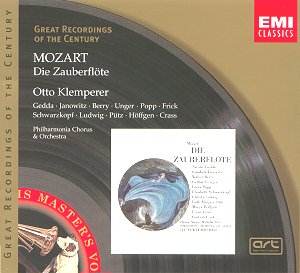MOZART
Die
Zauberflöte
 Gedda - Janowitz - Berry -
Unger - Popp - Frick - Schwarzkopf - Ludwig - Pütz - Höffgen -
Crass
Gedda - Janowitz - Berry -
Unger - Popp - Frick - Schwarzkopf - Ludwig - Pütz - Höffgen -
Crass
Philharmonia Chorus & Orchestra, Otto
Klemperer
 EMI Great Recordings of
the Century, CMS5 67388 2 2 Discs [63'20 & 70'34], Mid Price.
EMI Great Recordings of
the Century, CMS5 67388 2 2 Discs [63'20 & 70'34], Mid Price.

Otto Klemperer's 1964 recording of the Magic Flute has always been a magical
performance of a work Klemperer was somewhat in awe of. Like its two predecessors
on EMI - Beecham's 1938 performance with the Berlin Philharmonic and Karajan's
with the Vienna Philharmonic in 1950 - the conception is laid out on the
grandest of scales. There is no dialogue and a broadening of tempi where
others, particularly period performers, take the work more fluidly. In other
words, it is almost anathema to modern day tastes.
Incomplete and old-fashioned it may be, but this performance stands head
and shoulders above virtually all others. In part this is due to the singing,
which is superlative. Walter Legge had boasted that the cast would be near
perfect. In casting Schwarzkopf, Ludwig and Höffgen as the Three Ladies
- luxury casting it would be impossible to achieve today - he did indeed
create a performance that is vocally unrivalled, underpinned as it is by
the unmatched Sarastro of Gottlob Frick and the glorious Queen of the Night
of Lucia Popp.
From the very opening of the Overture, with divided violins etching their
notes like angels, this is first and foremost a classically poised performance.
There is weight of tone, but it is balanced by a natural lightness of touch.
Klemperer's great gift in this opera is his ability to unify the contrasting
elements of Mozart's scoring whether it be in the exalted seria in the Sarastro
and Queen of the Night arias, or the pantomime buffoonery of Papageno's arias.
Klemperer, often the most high-minded of conductors, is here a master of
the burlesque.
There is so much glorious singing in this recording it is difficult to point
out singular highlights for the whole performance is one unending highlight.
Lucia Popp's singing of 'Der Hölle Rache....' is an obvious choice the
high, murderous tessitura writing holding no fears for a voice which was
then young and at its most ecstatic. The Papagena and Papageno duet, near
the opera's close, has Ruth-Margret Pütz and Walter Berry knocking spots
off each other with the fleetest woodwind and strings joining in the fun.
Gottlob Frick achieves near impossibly low notes in his Isis and Osiris aria.
The Philharmonia (at a difficult time for the orchestra) are sublime to a
man, with Gareth Morris' flute perhaps taking the winner's prize for most
characterful playing. Klemperer himself was surely more vibrant than in any
other recording he made in studio post-war.
The stereo recording was always a success, with the balance between voices
and orchestra more natural than in some other issues from the time (Giulini's
Verdi Requiem, for example). EMI's remastering is well focused, if a little
dry, and there is some distortion in the choral section that ends the opera.
There is, however, more ambience than in previous issues of this recording
on CD and at mid-price cannot be missed.
Unlike some of EMI's recordings in this series this is truly a Great Recording
of the Century.
Marc Bridle
Performance

Recording

